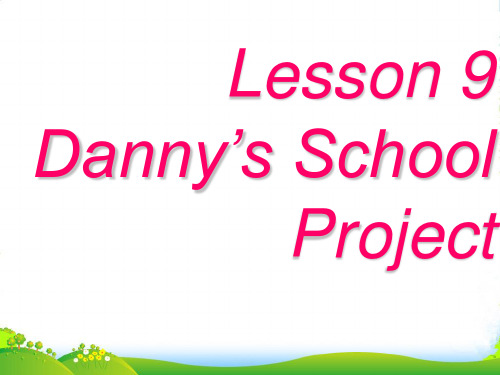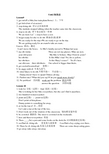冀教版七年级英语下册Unit 2 Lesson 9 教学课件
- 格式:pptx
- 大小:1.18 MB
- 文档页数:14



Lesson9Danny's School Project教学目标1.掌握单词:describe,build,ago,army,important,tool,more短语:try one's best,a long time ago,well done,a little bit,make-from-,etc.2.掌握和运用关于丹尼的中国之旅的句型:These things are very old.People built them a long time ago.They look like an ancient army.It's big and tall.It's an important tool on the Silk Road.It lives in the desert.Well done.Look at this picture.I'm riding a camel.It comes in many colours.Many things are soft and colourful.We can make clothes from it.3.能用本课词汇、短语和句型正确造句,并根据情景正确运用。
4.掌握一般过去时。
5.能用自己的语言介绍出一个国家的特色和标志性建筑,了解中国的文化。
6.增进学生们对于祖国的了解与热爱。
教学内容1.学会运用描述中国之旅的词或短语:describe,build,ago,army,important,tool, more,try one's best,a long time ago,well done,a little bit,make-from-etc.2.学会运用关于丹尼的中国之旅的句型:These things are very old.People built them a long time ago.They look like an ancient army.It's big and tall.It's an important tool on the Silk Road.It lives in the desert.Well done.Look at this picture.I'm riding a camel.It comes in many colours.Many things are soft and colourful.We can make clothes from it.3.能用本课词汇、短语和句型正确造句,并根据情景正确运用。




Lesson 9 Danny's School Project核心单词1. ________ v. 描写;描述2. ________ v. 修建;建造3. ________ adv. 前;以前4. ________ n. 军队;陆军5. clayn. ________6. soldiern. ________7. ________ adj. 重要的8. ________ n. 工具;用具9. desertn. ________10. ________ adj. &pron. (much/many的比较级)更多,较多单词变形1. describe—________(n. )2. more—________(原级)3. build—________(n. )—________(过去式)—________(过去分词)4. important—________(n. )—______________(比较级)核心短语1. ____________________尽某人最大的努力2._______________________很久以前3. __________________做得好4. ______________________一点点5. __________________用……制作……重点句型1. 让我们尽最大的努力来帮助贫困地区的孩子们。
Let's ________ ________ ________ ________ ________ the children in poor areas.2. 走了很长一段路之后,她有点儿累了。
After a long walk, she was________ ________ ________ tired.3. 很久以前,森林中有只老虎。
There__________a tiger in the forest ________ ________ ________ ________.4. ——我在竞赛中获得了一等奖。


Unit2知识点Lesson91. get on/off a (bike,bus train,plane/horse) 上,下车2. get in(to)/out of a(car,taxi)3. stop doing sth. 停止正在做的事The students stopped talking when the teacher came into the classroom.4. stop to do sth. 停下来去做另一件事We are tired. Let’s stop to have a rest.5. be/get ready for sth./ to do sth 准备好(做)某事We are ready for the trip.=We are ready to go on the trip.We are getting ready for an exam/to take an exam..6.move 移动,搬迁I can’t move the boxes. Li Mei’s family moved to Wuhan last year.7. my sth =mine These are not my glasses. Mine are new.your sth=yours My bike is broken.. May I borrow yours?his sth=his Is this Mike’s hat? No, his is yellow.her sth=hers Is this Mary’s eraser? Yes.It’s hers.our sth=ours their sth=theirs Our school is bigger than theirs.8. get excited/worried/sad 变得…9. be angry with sb 生某人的气10. (don’t)have to do sth.不得不做…不必做…;Danny doesn’t have to speak Chinese all day.11. Pardon (me)? What did you say?/Can you speak more slowly?12. No problem! 没问题work out the problem 解决问题answer the question 回答问题Lesson 101. look for寻找(过程)find 找到(结果)She is looking for her bike everywhere, but she can’t find it anywhere.2. two hundred women teachers3. point at(近指) ;point to(远指)Don’t point at him,please.Danny points to something far away.4. at /on the top of 在…顶部Let’s put a star at the top of the tree.5. Don’t look out of the window of the classroom. 别向教室窗外看6. be crowded 拥挤的The street is crowded on the weekends.7. here and there=everywhere 到处8. There ____(be) a pen and some books on the desk.(be动词根据就近原则)9. see/find sb. doing sth. 看见某人做某事I see/find a boy crying over there..10. There be sb. doing sth.有某人在做某事There are some sheep eating grass.11.go away ;take away; run away1.on the farm在农场live on the twelfth floor住在第12层楼2.suddenly(adv)突然(常用语句首或句末)Suddenly, I heard someone calling“help”突然,我听到有人喊救命3. listen t o…听(过程)hear 听见(结果)hear sb. doing sth.______(听)!Can you_____(听见)someone ________(唱) in the next room?4.voice (n) 嗓音Deng Lijun has a sweet voice.5.scare(v) 惊吓---(adj)scared 害怕的You scared me. 你吓了我一跳Don’t be scared. 别害怕be scared of sb/sth 害怕…The girl is scared of dogs/doctors.be scared of doing/to do sth害怕做某事I’m scared of going out/to go out at night.6.Of course=Sure=Certainly 当然7.interesting places= places of interest 名胜古迹8.hope+将来是从句. I hope you will enjoy your trip .我希望你旅行愉快hope to do sth. I hope to see you soon.我希望很快见到你I hope so. .希望如此I hope not.希望别那样9.enjoy doing sth.=have fun doing sth. 喜欢做某事Children enjoy watching TV.10. I’m not sure. 我不确定11.a lot of=lots of 修饰可数名词复数或不可数名词Lesson 121.wait for sb./sth.to do sth.“等待某人/某物干某事”;服务员waiter(男) waitress(女) We’re waiting for the bus to come.2.finally=at last=in the end “最后,终于”3.something to eat/drink “吃的/喝的东西”4.one’s own sth.“某人自己的东西”This is my own computer5.Anything else= What else would you like? 你还要点别的吗?else后置修饰不定代词及特殊问词6.Please call me when you arrive.三个“到达”,只有arrive可单独使用,后不跟地点Lesson 131.“可能”Maybe(用于句首)=主语+may beMaybe Mr Smith is in the library.= Mr Smith may be in the library.2.quiet(adj)---(adv)quietly“安静的,安静地”Please be/keep quiet. 请安静/请保持安静They are reading newspapers quietly. 他们在静悄悄地看报。





冀教版英语七下Unit 2《Lesson 9 Danny’s School Project》教学设计一. 教材分析冀教版英语七下Unit 2《Lesson 9 Danny’s School Project》主要讲述了Danny 在学校项目中介绍了他的家乡,通过他的介绍,学生可以学习到关于家乡的词汇和表达方式。
本课的主题是家乡介绍,学生可以通过本课的学习,提高自己的口语表达能力和听力理解能力。
二. 学情分析学生在进入本课学习之前,已经学习了有关家乡的基本词汇和表达方式,对于本课的主题,学生应该已经有一定的了解。
但是,学生的英语水平参差不齐,部分学生的口语表达能力和听力理解能力有待提高。
三. 教学目标1.能够听懂、会说、会读本课的生词和句型。
2.能够通过听力理解,了解Danny的家乡介绍。
3.能够运用所学词汇和句型,进行简单的家乡介绍。
4.能够提高自己的口语表达能力和听力理解能力。
四. 教学重难点1.重点:本课的生词和句型,以及Danny的家乡介绍。
2.难点:如何运用所学词汇和句型,进行流畅的口语表达。
五. 教学方法1.任务型教学法:通过完成各种任务,激发学生的学习兴趣,提高学生的学习积极性。
2.情境教学法:通过设定真实的情境,让学生在实际的语言环境中学习英语,提高学生的语言运用能力。
3.听力教学法:通过反复的听力训练,提高学生的听力理解能力。
六. 教学准备1.教学课件:制作教学课件,包括本课的生词和句型,以及Danny的家乡介绍。
2.听力材料:准备相关的听力材料,以便进行听力训练。
3.教学卡片:制作生词卡片,方便学生学习和复习。
七. 教学过程1.导入(5分钟)教师通过提问方式,引导学生谈论自己的家乡,激发学生的学习兴趣。
2.呈现(10分钟)教师通过课件,呈现本课的生词和句型,以及Danny的家乡介绍。
让学生听录音,跟读并模仿。
3.操练(10分钟)教师设置情境,让学生进行角色扮演,运用所学词汇和句型,进行家乡介绍。
